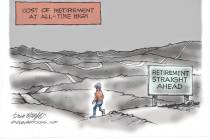EDITORIAL: IRS in dire need of greater accountability
When thieves stole 40 million credit and debit card numbers from Target customers during a massive data breach in 2013, the company eventually agreed to pay $10 million under a proposed settlement in a class-action lawsuit. Experts said that the incident could have been avoided if the company had adopted and implemented better data security measures, and the Department of Justice even looked into the matter.
While Target undoubtedly should have done a better job of protecting its customers, it would be fantastic if that same emphasis on security and accountability applied to the federal government. But it doesn’t. With tax day right around the corner, for example, it’s a good time to take a look at the widespread dysfunction and incompetence at the Internal Revenue Service.
On the heels of the ongoing Lois Lerner debacle — last week, the DOJ said it would not pursue criminal contempt charges against the former IRS official for the agency’s targeting of conservative groups — a new Government Accountability Office report revealed that former IRS employees have access to taxpayers’ sensitive financial information, as do current agency employees who aren’t authorized to have it. Some visitors to IRS facilities might also have unauthorized access to the data, as well. If the IRS doesn’t fix its security issues, the GAO warns, “taxpayers could be exposed to loss of privacy and to financial loss and damages resulting from identity theft or other financial crimes.”
Not only are authorized employees and visitors reportedly allowed access to restricted areas, but the agency has also repeatedly rehired people previously fired for illegally viewing data. As the folks at Reason.com reason, this easy access to data may (at least partly) explain why IRS employees are regularly discovered to be identity thieves and filers of fraudulent returns. The agency also has a history of overstepping its authority and handing over sensitive data to law enforcement.
It would be one thing if the IRS was blissfully ignorant of all of these issues. But it isn’t. Not only do agency officials know about them, but they know what to do about them, as well. They’ve even created what appears to be a solid plan to handle the issues. But they still haven’t implemented it, leaving citizens at risk.
All of the problems at the IRS may play a role in the staggering amount of delinquent taxes owed by federal employees. Federal employees owed more in back taxes last year than they did in any year in the last decade. More than 113,000 — or one in four — civilian government employees declined to pay all of their taxes in 2014, costing the IRS $1.4 billion. According to a House bill introduced recently, those employees would be ineligible to work for federal agencies until they paid their taxes.
“These employees are not exempt from their civic responsibility to fulfill tax obligations,” says Rep. Jason Chaffetz, R-Utah, chairman of the House Oversight and Government Reform Committee, “and those who refuse to pay what they owe should be held accountable.”
The federal government pounces on private citizens and private companies when it comes to security and tax issues. Federal employees and agencies should be subject to the same rules.























